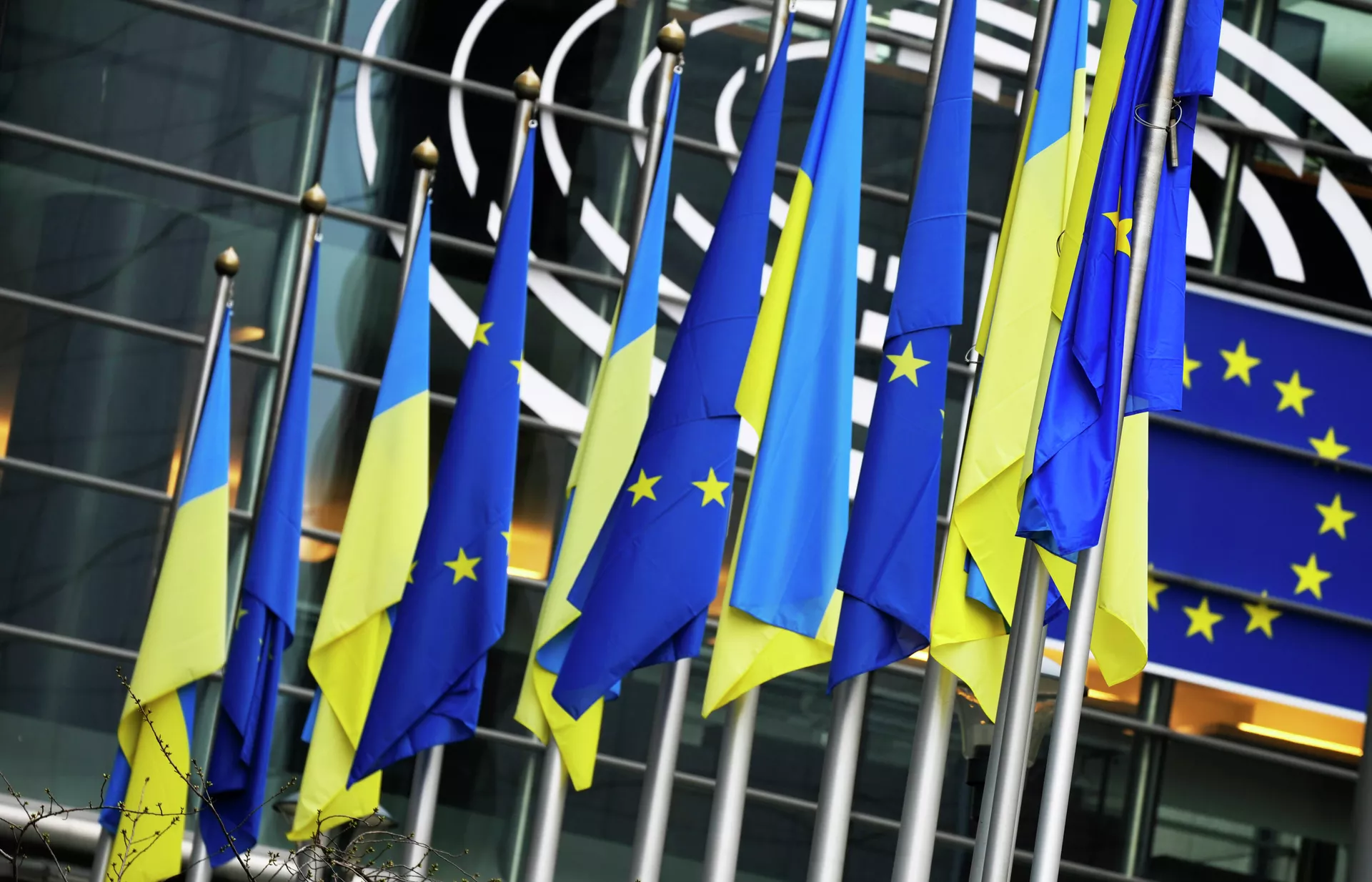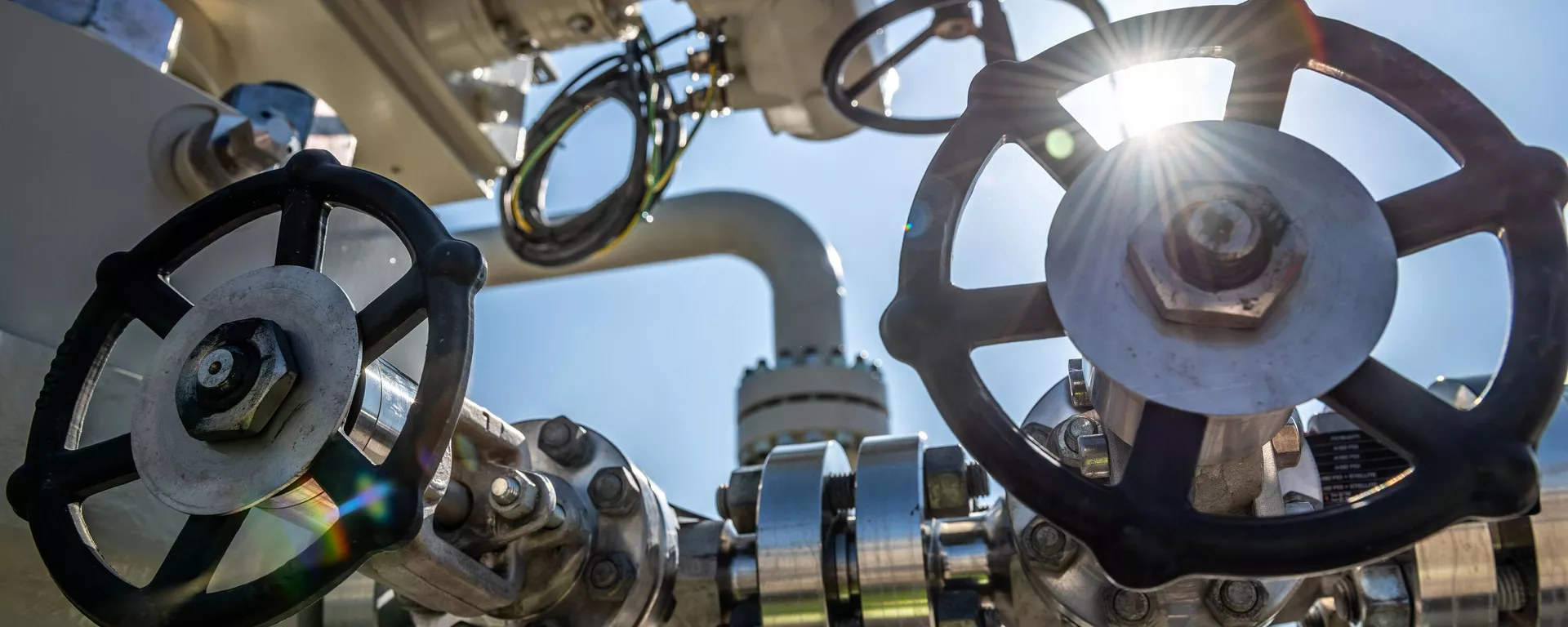Scholars: EU's Russia Energy Ban Will Cause Price Hike, Falling Living Standards & Unrest in Europe

© AFP 2023 / ANDREY GOLOVANOV
Subscribe
US President Joe Biden's European trip includes meetings with NATO, EU and G7 allies and is aimed at discussing further arms supplies to Ukraine and persuading the EU to ban Russian energy imports to "impose economic costs" on Russia. At what price will the new package of sanctions come for the Europeans?
"The economic consequences for Europe are already dire, and they're just going to be worse. Unlike Russia, Europe is not self-sufficient when it comes to energy, nor when it comes to the production of food. So the price of food will climb and, in general, the living standard in Europe will fall," says Professor Stevan Gajic, a research associate at the Institute of European Studies in Belgrade.
Reuters admitted on 22 March that European energy and commodity markets are currently "in shock." After the beginning of the Russian special operation to "de-militarise and de-Nazify" Ukraine, launched under Article 51 of the UN Charter, the US and its NATO allies and partners imposed unprecedented sweeping sanctions on Russia. Since then, prices across gas, oil, metals and agricultural markets have leaped and have become very volatile, according to Reuters.
The UK and the US are also struggling with soaring energy costs, fuel bills and food prices. According to the Office for National Statistics, UK inflation has hit a 30-year high as British consumer prices rose 6.2% from February 2021. The US consumer price index has jumped 7.9% from a year earlier – a fresh 40-year-high – according to the Labor Department.
Meanwhile, the price of natural gas in Europe exceeded $1,350 per 1,000 cubic meters on 23 March, following Russian President Vladimir Putin's announcement that Russia will start selling gas to "unfriendly countries" in rubles. Both Brent and West Texas Intermediate (WTI) crude futures remain well above $100 per barrel, seeing yet another hike on Wednesday on the news of the possible expansion of Russia energy embargo. Energy markets are now struggling to tackle the potential loss of about 2 million barrels per day (bpd) of crude from Russia given that any replacement oil is likely to be months away.
New Energy Price Hikes Ahead
If Europe were to go ahead and ban the import of Russian oil, coal, gas and other energy sources, then energy prices would rise substantially in Europe, warns Alexander Clackson, founder of Global Political Insight, a UK-based think tank. Even though this situation creates commercial opportunities for the US in the EU market, the problem is that neither the US nor other energy producers could immediately fill the gap left by Russia's oil and gas supplies, according to the observers.
"On an annual basis, Europe imports nearly 155 billion cubic metres (bcm) [of natural gas] from Russia, which the US would be hard pressed to fully substitute," explains Justin Dargin, global energy scholar at University of Oxford. "Europe is going to find itself in an extremely difficult position to fully transition away from Russian gas over the next couple of years, and the US won’t be able to fully supply Europe’s gas needs."
In addition to that, the US is incapable of quickly step up the production of LNG since the US gas industry has been traumatised by the economic pain it felt from 2014-2017 and the pandemic and is currently exercising "capital discipline," according to the energy scholar.
When it comes to crude, even though the US is likely to reach nearly 12.6 million barrels per day by 2023, and OPEC is likely to step up crude production in the future, it will take time, says Dargin.
"We are still expected to witness elevated oil prices due to the ban on Russian oil, which will have a negative impact on consumers," the energy scholar admits.

Ukraine and European Union flags hang together on the exterior of the building prior to an extraordinary plenary session on Ukraine at the European Parliament in Brussels, Tuesday, March 1, 2022
© AP Photo / Virginia Mayo
Europe Divided Over Sanctions War
European countries are aware of the potential consequences of the sanctions spree and remain divided over the imposition of the US-backed oil embargo on Russia, according to Alexander Clackson.
"[T]he countries of the former Soviet Union, especially in eastern Europe, such as Lithuania and Poland, et cetera, are very much in favour of an oil ban," the UK-based scholar says. "However, many countries in the West, including Germany and the Netherlands, are very much against this because energy prices in the West have risen substantially over the last few weeks and months, and a ban on Russian oil would worsen the situation further. For the Netherlands, a ban on Russian oil is a red line. They will not cross it whereas for Germany, the red line is a ban on coal - they're also not prepared to go down that path."
Moreover, some countries in the EU are not in favour of any stringent sanctions against Russia, the scholar notes, referring to Hungary: Budapest is "keen not to isolate Russia completely".
There is also the issue of trade: many Western companies that have pulled out from Russia are going to feel the negative effect from that, according to Clackson. Furthermore, the sanctions war against Russia is likely to backfire against the global economy:
"Global trade and the global economy will significantly decrease because of the sanctions war, which will obviously affect all countries, including the countries of Europe and the United States," warns the scholar.

U.S. President Joe Biden arrives to board Air Force One at Joint Base Andrews in Maryland
© REUTERS / EVELYN HOCKSTEIN
Nevertheless, it appears that the elites of major EU members Germany and France are "too weak to stand" against the US pressure and the ongoing media hysteria over Russia's Ukraine operation, according to Stevan Gajic.
The volatile economic situation has already resulted in popular protests in Spain. Roughly 150,000 farmers, ranchers and hunters marched through Madrid on 20 March to protest the Spanish government's failure to tackle soaring prices amplified by the EU sanctions on Russia over the Ukraine special op. There is the risk of growing civil unrest in Europe in the future, Gajic forecasts.
"In the long term we may see demonstrations and protests in Europe because we have had the situation of the COVID-19 pandemic, which has obviously hit the global economy quite hard, including in Europe," echoes Alexander Clackson. "As the economy continues to suffer and living standards potentially decrease, we of course, may see a situation where people become quite agitated because of the conditions and may urge the government to change course in order that ordinary people do not suffer as much."
According to Clackson, for the leadership of Europe and the United States "the priority has always been to undermine Russia, to contain Russia and ensure that Russia's influence does not grow." This policy is coming at a price for ordinary Europeans, he stresses, adding that "while this process is ongoing, many ordinary people will suffer for the foreseeable future."




